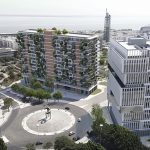Portugal’s property market consolidates and diversifies
Last year was a record year for Portugal’s property market according to the Portuguese Association of Property Developers and Real Estate Investors (APPII). But if 2018 was a year of growth and expansion, then in 2019 the market will consolidate with REITS becoming a factor says Hugo Santos Ferreira, APPII Executive Vice President.
Text: Chris Graeme
2018 – a boom year
Portugal succeeded in netting a staggering €30Bn in investment through the property market in 2018. Representing 15% of Portugal’s GDP that year, the sector, together with tourism, represents one of the key drivers for the Portuguese economy.
In fact Portugal’s property market has been growing an average of 20% per annum year-on-year since 2014 – 80% in four years — from when Portugal emerged from one of its most serious economic crises in modern times.
“Our sector suffered a terrible crisis between 2009-2014. In 2014 we began to emerge from that crisis achieving €12Bn of investment. Since then, we have grown 20% per annum. A lot of this investment is Portuguese, but about 20-25% was foreign investment in the residential sector while 80-85% of investment in the commercial property sector was from overseas investment in real estate” says Hugo Santos Ferreira.
In 2018 foreign investment represented €5Bn to the Portuguese economy. (25% Portuguese investment and 5% foreign investment).
Hugo Santos Ferreira says that the Portuguese property market is one of the main drivers of the economy in terms of what he called “real estate exports”.
“Portugal is selling property to foreigners and although technically and legally speaking this cannot be considered exports, last year we know we achieved €5Bn of investment from overseas investors.
Santos Ferreira says that if to this €5Bn figure, the €10Bn in revenues from the total amount of Portuguese construction and property developer companies operating overseas is added (such as the impact of revenues from the Portuguese construction giant Mota Engil), then together the Portuguese economy netted €15Bn in 2018 from the property sector.
The APPII vice chairman adds that if this €15Bn, which he says results from the “internationalisation of the sector,” is then compared with traditional sectors of the Portuguese economy such as footwear from which exports reached €2Bn and textile and clothing which last year raked in €5Bn, then the importance of the €10Bn garnered from the internationalisation of the real estate sector is apparent.
“With these two, investors can clearly see the importance of the real estate market today in Portugal and the internationalisation of our property market” he says.
2019 – a year of consolidation
Hugo Santos Ferreira believes that this year Portugal’s property market is entering a consolidation phase in which the “crazy period of market growth” will settle down and consolidate.
He says that it is at this consolidation phase that the Real Estate Investment Funds (REITS) and Core Investors enter the market — the last investors to invest in the real estate cycle.
The cycle for Portugal began when the country hit rock bottom with the IMF/EU/ECB Troika effectively governing Portugal’s broken economy from 2011 when ratings agencies had rated Portugal’s investment assets as highly speculative or ‘junk’ status.
It was from 2011 until 2014 that opportunistic or vulture investors entered the market, attracted by the scent of distressed assets and moribund tourism property developments. Now, at the crest of the cycle the value added and core investors have entered the market, meaning real estate development companies. “We have reached the cycle of consolidation and it is a good time for large developers,” says Santos Ferreira.
Santos Ferreira says that the Portuguese Government’s approval of Portuguese REITS sent out the signal for some institutional investment funds that had been waiting to enter the Portuguese market for some years, to finally invest.
“Before, these investors would not invest in Portugal because we did not have this REITS regime (known as SOCIMI in Spain) in place, although it was being negotiated and debated at the time of the previous centre-right PSD government,” he explains.
Now, one major international listed real estate investment company devoted to commercial assets on the Iberian peninsular, Merlin Properties S.A. has entered the Portuguese market. With a Gross Asset Value of €12Bn, a Gross Rental Income of €500 million, a 5.8 year wault (weighted average unexpired lease term) and 93.4% occupancy rate.
In January this year, Merlin expanded its Lisbon prime office portfolio with two new buildings in Parque das Nações – the Art and TFM buildings in this dynamic area of Lisbon which used to be the Expo 98 site.
The acquisition brings the comany’s footpring in the city to over 100,000m2 while consolidating its position as one of the leading players in the city. The office assets, located in Dom João II, the main avenue in Parque das Nações, comprises 29,985m2 of gross letable area.
Says Santos Ferreira, “Other such companies are studying the Portuguese market since the Government passsed the REITS law and this os partly because these long-term investors know that the vast majority of the fundamentals of our economy are sound. We are a growing economy (1.9% GDP expected for 2019), we are a secure country and are considered by the Global Peace Index to be the third safest country in the world.”
“Our real estate offers good yields with a fair expecation that assets will gain in value. We are also a fashionable country worldwide,” adds Santos Ferreira.
In fact rental yields in Portugal are currently averaging out at 5.45%, ahead of Spain (4%), Greece (3.9%), Italy (3.9%) and the Netherlands (3.72), but with a much safer investment climate than Eastern European countries offering high yields like Moldova (10%), Ukraine (9%) or Romania (6%).
REITS were supposed to have been approved under the previous Government and the then Secretary of State for Fiscal Affairs, Paulo de Faria Lynce Núncio. That centre-right PSD government left power and it took a further three years of negotiations with the current PS socialist government to approve the REITS regime.
“For us, it was obvious three years ago that the REITS regime was badly needed because it is such an important instrument to attract new investments” stresses Santos Ferreira who adds that the property market in Portugal is currently facing two main two problems: a lack of offer and rising prices as a result of the first.
“These two problems can only be solved one way – getting more investors to put more product on the market to stem rising prices. REITS are definitely one of the answers to attracting investors and this is the right time in Portugal” says Santos Ferreira adding that Real Estate Investment and Management companies – SIGIs are not opportunistic, but rather long-term investors interested in commercial and residential assets in a consolidated market.
“If we can bring in different and very professional types of investors, like REITS, it is good for Portugal and its property market since it introduces more competition and professionalism into our real estate market which is excellent for creating new product offer, including new offer for residential purposes” explains Santos Ferreira.
Room for improvement
The vice president of the real estate investors association says that while Portugal is definitely going in the right direction with the introduction of Portugal’s Golden Visa regime for non-EU HNWI investors and the Non-Habitual Residents (NHR) regime which offers attractive tax allowances to general investors, the Government still had a way to go in orer to make Portugal a more friendly environment for investors, particulalry in terms of thre time it takes to get planning permission in Portugal and the rental law which has changed frequently over the past decade.
“We definitely need stability in taxes from the government. We still don’t have a stable country in terms of some laws such as housing laws and leasing and rental laws. In the last decade it was changed once a year!” Santos Ferreira points out.
Santos Ferreira points to interest from the UK’s Roundhill Capital, one of the biggest investors in the rental market and just one of the various institutional investors with plans to create portfolios with university halls of residences in Portugal.
“Roundill is the biggest market operator on residential leases. When they asked me about the Portuguese rent law, I could not say the best and this is crazy!” he says,
“If you are an investor, it’s very difficult to create a business plan knowing that rental laws chop and change with every new government”, he adds.
On the positive side, interest from these types of investors is likely to remain high for the time being since consolidation in the market has led to a compression on yields in more traditional sectors.
This makes investments in new types of product such as Co-Working, Co-Living and Student Accommodation an attractive alternative because initial investment outlay is cheaper and the yields are fairly good.
Santos Ferreira says that this is why Student Housing, Co-Working and Co-Living are the biggest trends not only for Portugal, but worldwide right now.
“Before the crisis our focus was on opening our market out to the world, including our real estate market. If you had asked me 10 years ago what I thought of the real estate sector before the Troika intervention in 2011, I would have said that Portugal had a very closed market and a huge lack of innovation. Today, in 2019, we are a fast-growing innovation market which is open to international business.
Planning permission woes
Santos Ferreira believes that Portugal still needs to solve the problem of the time it takes to get urban planning permission in Portugal.
“We have just done a study with our developers to discover how long it takes for planning permission to go through and in all the cases we have seen, it take more than one year with some cases taking two years, and others up to two years and nine months.
“You cannot have this in a modern, dynamic and civilised country. If you compare Portugal with Spain in this repsect, the average time is not more than one year and the maximum is 18 months. This is one of the most important reforms that we need to make now to our investment environment framework, particulalry to solve the chronic lack of housing available for the middle class in Portugal.
Despite these persistant problems, Hugo Santos Ferreira sends out one clear message to the international institutional investment market.
“Most of the pro-investment fundamentals and incentives are now in place and Portugal today offers good opportunities for these investors. We are very attractive for Co-Living and Co-Working opportunities and these new investors are welcome. We are open for business!”










